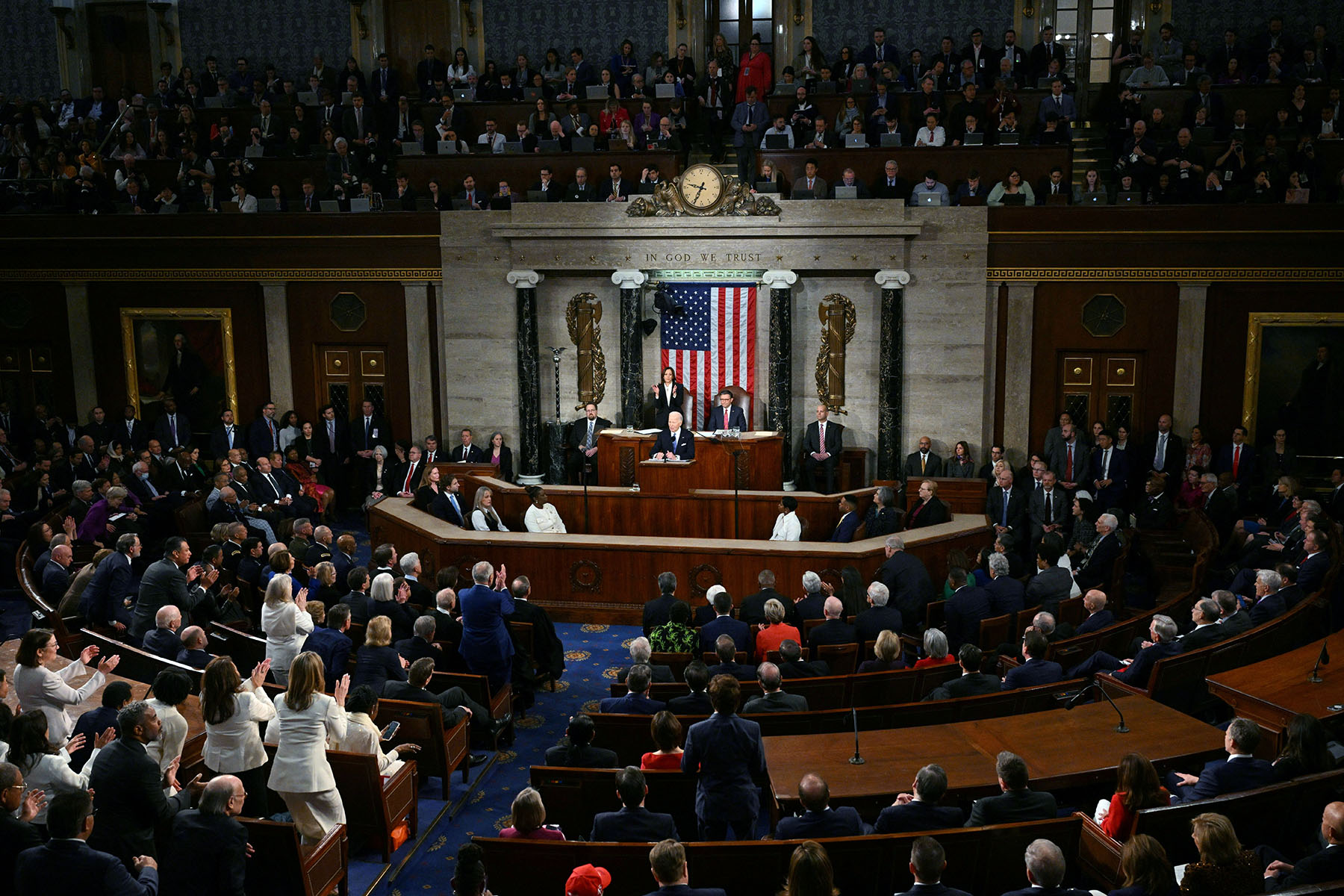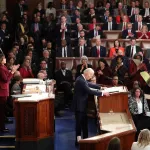Sen. Patty Murray brought Kayla Smith, who moved to Washington after she traveled there for an abortion she hadn’t been able to get in Idaho for a nonviable pregnancy. Virginia Sen. Tim Kaine brought Elizabeth Carr, who in 1981 was the first baby conceived through in vitro fertilization (IVF) born in the United States. Rep. Joyce Beatty brought Brittany Watts, the Ohio woman who was arrested last year after miscarrying.
And in First Lady Jill Biden’s box for Thursday night’s State of the Union address were two guests with personal stories about the impact of the end of a federal right to abortion: Kate Cox of Texas, who sued in an effort to receive an abortion in her home state after learning that her pregnancy was not viable, and Latorya Beasley, an Alabama IVF patient whose scheduled embryo transfer was canceled after her fertility clinic temporarily halted that treatment in the wake of an explosive state Supreme Court ruling.
President Joe Biden’s speech and the surrounding activity are a sign of how central Democrats see reproductive rights in this election year. Neither IVF nor contraception has ever come up in a Biden State of the Union. And abortion has never been a focus.
This year, Biden promised to restore the protections of Roe v. Wade if he has the votes in Congress after November’s election. He also called on lawmakers to pass a law ensuring the right to IVF.
“Clearly those bragging about overturning Roe v. Wade have no clue about the power of women. But they found out when reproductive freedom was on the ballot and won in 20…22 and we’ll win again in 2024,” he said.
Almost three dozen lawmakers brought guests who have some connection to reproductive health, including abortion and IVF patients and providers. Members of the House Pro-Choice Caucus wore white and donned pro-reproductive-rights pins at the speech.
-
Read Next:
“This year’s State of the Union is going to be one unlike any before, because I fully expect abortion and reproductive rights to be front and center,” Mallory Newall, vice president of public polling for Ipsos Public Affairs, which has done extensive research on how voters perceive abortion, said before the speech. “You see that in the guest list.”
The February ruling in Alabama threatening IVF galvanized Democrats and put Republicans on the defensive. And Biden is now officially set for a rematch against former President Donald Trump, who appointed the U.S. Supreme Court justices responsible for overturning Roe v. Wade with the Dobbs vs. Jackson Women’s Health Organization ruling.
Ryan Stitzlein, vice president of political and government relations at Reproductive Freedom for All, said Trump effectively locking up the Republican nomination should be a “lightbulb switch” moment for those not yet tuned in to the presidential race.
“The threat of Donald Trump returning to the White House is very real,” he said. “And the stakes for reproductive freedom and abortion access have never been higher. This is not a normal election where we have to imagine or predict how someone would act in office. We know what Donald Trump would do with a second term because we saw what he did his first term.”
Rohini Kousalya Siva, an aspiring OB/GYN and the president of the American Medical Student Association, was among the members of the medical community present at the speech as a guest of her congressman, Rep. Bobby Scott of Virginia.
“It means so much to me,” she said before the speech. “It shows that there are legislators out there who want to listen to what medical students, what future physicians have to say. And that voice really matters.”
-
Read Next:
A heavy emphasis on reproductive health — specifically abortion, IVF or contraception — marked a clear break from how Democrats including Biden have historically framed the issue. Biden briefly mentioned abortion rights in his 2023 address, promising to veto a national abortion ban if one made its way to his desk and criticizing state laws that had outlawed the procedure. In 2022, in an address months before the Dobbs decision, Biden referred more obliquely to the issue, arguing for the importance of defending “a woman’s right to choose” and “the constitutional right affirmed by Roe v. Wade.”
The Biden administration has pursued some executive action meant to shore up abortion access where it is legal, including offering support for members of the military who may need to travel for legal abortion and asserting that hospitals are required to provide abortion when it is a stabilizing treatment for a medical emergency. The Department of Justice has also challenged elements of Idaho’s abortion ban in a case that will be heard before the Supreme Court this April, and the federal government has defended access to mifepristone in a separate case to be argued later this month. But without congressional majorities ready to pass abortion protections, there are limits to what the executive branch can achieve.
“It’s kind of stunning to me in my lifetime to be where we are tonight at the State of the Union,” Murray said in an interview Thursday. Before Roe, she recalled, women “went through horrific challenges, and made tough decisions, and no one knew.”
“And now today, women are fighting back and they are at the State of the Union, in front of the nation, in front of the president, in front of Congress, saying we want our rights back,” she said.
Her guest, Smith, said she was “honored” to be present at the address.
“I never thought I would get this opportunity,” she said. “It’s devastating what I had to go through. And so I just hope that someone who hears my story realizes that this really is a big issue and that abortion is really nuanced.”
Biden has promised to restore the protections of Roe if voters also give him a Democratic Congress, an uphill battle given Democrats’ tough odds of holding the U.S. Senate, much less gaining a filibuster-proof majority. But many advocates want him to go further, beyond Roe. He’s rankled some abortion rights activists with a series of recent comments underscoring his own personal discomfort with abortion. Even in Thursday’s speech, Biden never used the word “abortion,” referring instead to “reproductive freedom” and “Roe v. Wade.”
-
Read Next:
“I would love for the president to stop making excuses,” said Emma Burns, an Arizona-based abortion storyteller and youth organizer. “We deserve to go to the polls in November and have a candidate that’s willing to fight for us, and not tiptoe around all of the issues that American citizens really want to see change in the country.”
Jennifer Welch, president and CEO of Planned Parenthood of Illinois, noted that 2024 is the first State of the Union address in which congressmen from the state, Reps. Jesús “Chuy” Garcia and Raja Krishnamoorthi, are bringing representatives of Planned Parenthood as their guests. She said it points to how many more people have “skin in the game” since the fall of Roe.
“It has made people who traditionally did not pay attention to this issue politically now pay attention,” she said. “It’s up to us to never let the heat up on it.”
A heightened emphasis on reproductive health matched a presidential campaign in which reproductive rights has increasingly been a defining issue.
Both Biden and Vice President Kamala Harris were quick last week to offer praise when CVS and Walgreens, the nation’s two largest retail pharmacy chains, announced that later this month they would begin dispensing mifepristone, one of the two drugs used in a medication abortion. First Lady Jill Biden emphasized abortion rights in campaign stops last weekend in Arizona, Nevada and Wisconsin. Biden and Harris both have repeatedly criticized the Alabama State Supreme Court for its February 16 ruling that granted embryos the same legal protection as people.
It’s an emphasis that could resonate. A poll released Thursday morning by the nonpartisan group KFF found that 1 in 8 voters say abortion is their top issue, and about half believe that the election will significantly influence abortion rights. Young voters, women and Black voters — and particularly Black women — are more likely to say abortion is their top electoral concern and to say they do not want legal restrictions on the procedure. The majority of voters, including two-thirds of Democrats and independents, support passage of a law guaranteeing a federal right to an abortion, and most voters oppose a policy like the 16-week abortion ban reportedly backed by Trump.
Stitzlein said ahead of the speech that the State of the Union is a “great opportunity” for Biden to highlight the administration’s work on reproductive rights and appointment of liberal judges to the bench — and contrast it to how Trump could restrict abortion with or without Congress.
Biden did not directly call out his opponent by name in the speech, but he referred to Trump numerous times. Biden’s campaign is also releasing a series of statements and memos contrasting Biden’s record to Project 2025, an initiative by former Trump staffers outlining potential administrative priorities if the former president wins a second term.
Polling for the Wall Street Journal found that when presented with a list of issues, voters were most likely to say that they would not vote for a candidate who disagreed with them on abortion, specifically. Another poll, conducted by Ipsos, found that two-thirds of Americans oppose the Alabama court ruling.
“The widespread opposition to treating frozen embryos as people is just one more example of Republican lawmakers and conservative justices in our post-Dobbs world pushing restrictions around reproductive health that go far beyond where the public is,” Newall said.
For two State of the Union speeches in a row, Texas women who have spoken out about the state’s strict abortion ban — and challenged it in court — have sat in the first lady’s box. Dr. Damla Karsan, Cox’s doctor and a physician plaintiff in a lawsuit led by Amanda Zurawski, the first lady’s guest last year, called Texas a “bellwether” for the loss of abortion rights nationwide — and said she’s resisting the “culture of intimidation” that has followed.
“Most of my colleagues have been muzzled in their ability to speak out,” she said. “I’m fortunate that I have an independent practice and I’m pretty strong willed, but it’s been hard.”








